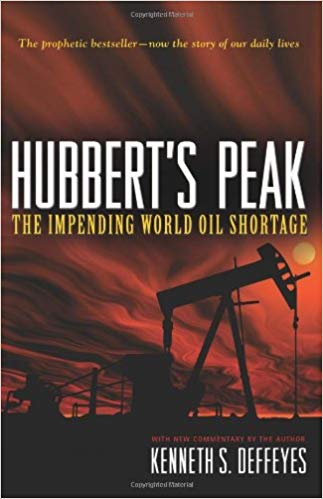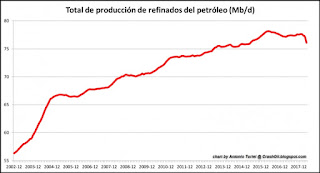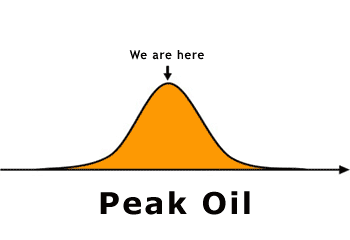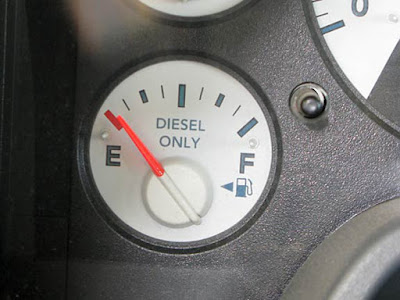In a recent post, Antonio Turiel proposed that the global peak of diesel fuel production was reached three years ago, in 2018. Turiel’s idea is especially interesting since it takes into account the fact that what we call “oil” is actually a wide variety of liquids of different characteristics. The current boom of the extraction of tight oil (known also as “shale oil”) in the United States has avoided, so far, the decline of the total volume of oil produced worldwide (“peak oil”).
Home » Posts tagged 'peak oil' (Page 8)
Tag Archives: peak oil
Australian Fuel Security Review ignores peak oil in China 2015 (part 1)
Australian Fuel Security Review ignores peak oil in China 2015 (part 1)
Just a week before a Federal election was called the Australian Minister for Energy, Markus Taylor, released an interim report on fuel security on 4th April 2019 for public consultation (hereinafter called “Review”). The announcement of the report release was done without great fanfare, possibly with the intention not to enter a heated election debate.
http://www.environment.gov.au/minister/taylor/media-releases/mr20190404.html
This report was initiated by the previous Prime Minister Malcolm Turnbull in May 2018
https://www.abc.net.au/news/2018-05-07/australia-has-limited-emergency-fuel-stocks-left/9734164
The last report (National Energy Security Assessment 2011) was done by the previous government (Resource Minister Martin Ferguson) in December 2011
https://www.energy.gov.au/sites/default/files/national-energy-security-assessment-2011_0.pdf
What has changed since then?
In the 1st part of this article we look at Australian graphs. The Review doesn’t show these details.
Australian oil production has further declined, 3 refineries have closed, oil and fuel stocks have dropped by 45% and fuel imports from Asia have surged. China’s oil production peaked in 2015, oil imports doubled and the South China Sea has been militarized to secure oil supply routes. Oil prices went through a roller coaster from $110 in 2011 to $30 in Jan 2016 and back up to $70 now. It seems surging US shale oil production can’t keep prices constant at reasonable levels. The media hype about the US being a swing producer isn’t justified.

Of course, the government doesn’t like the word “peak oil”. To be fair, the Review mentions that Australia’s oil production is in decline while consumption has increased (p 26). The following graph shows monthly production:

The uptick in condensate production is a result of increasing offshore gas production. Note that condensate and LPG have lower energy content per barrel.
…click on the above link to read the rest of the article…
Energy Dominance Isn’t Just a Trump Obsession
Energy Dominance Isn’t Just a Trump Obsession
Energy Dominance should be the catchphrase of the day. It’s on the minds of every political figure, and the focus of every economy.
This is especially true of those vulnerable to a change in the status quo, namely Saudi Arabia.
While some continue to believe the gyrations of the oil market over the past few months are evidence of our running up against the limit of the petroleum based global economy, I disagree.
The world is awash in decades of easily-extracted oil and gas. The supply of it has been kept off the market due to its centrality in the grand game of geopolitics. But, it has nothing to do with the amount of oil and gas out there.
Peak oil has become a religion among its adherents. Decrying the U.S. shale boom, rightly, for its profligacy has more to do with it being a consequence of disastrous central bank inflation rather than some grand plan of the ‘cabal’ because we passed peak EROEI some time ago.
When you drop interest rates to zero and flood the world with liquidity that can only find a home in equity markets, the natural result is malinvestment into unsustainable business practices.
The first wave of the shale boom in the U.S. occurred during this period and created the dynamic we have today. It’s groundwork was laid when oil prices spiked during Greenspan’s post-9/11 reflation and the Iraq War took a lot of marginal supply off the table.
That sparked a gold rush mentality and a huge boom occurred as oil prices kept rising after “Bernanke saved the world” with trillions in liquidity and multiple rounds of QE.
Properties were bought based on sky-high valuations which were the result of searching for yield in a yield-free world.
…click on the above link to read the rest of the article…
How the Peak Oil story could be “close,” but not quite right
How the Peak Oil story could be “close,” but not quite right
A few years ago, especially in the 2005-2008 period, many people were concerned that the oil supply would run out. They were concerned about high oil prices and a possible need for rationing. The story was often called “Peak Oil.” Peak Oil theorists have also branched out into providing calculations that might be used to determine which substitutes for fossil fuels seem to have the most promise. What is right about the Peak Oil story, and what is misleading or wrong? Let’s look at a few of the pieces.
[1] What Is the Role of Energy in the Economy?
The real story is that the operation of the economy depends on the supply of affordable energy. Without this energy supply, we could not make goods and services of any kind. The world’s GDP would be zero. Everything we have, from the food on our dinner table, to the pixels on our computer, to the roads we drive on is only possible because the economy “dissipates” energy. Even our jobs depend on energy dissipation. Some of this energy is human energy. The vast majority of it is the energy of fossil fuels and of other supplements to human energy.
Peak Oilers generally have gotten this story right, but they often miss the “affordable” part of the story. Economists have been in denial of this story. A big part of the problem is that it would be problematic to admit that the economy is tied to fossil fuels and to other energy sources whose supply seems to be limited. It would be impossible to talk about growth forever, if economic growth were directly tied to the consumption of limited energy resources.
[2] What Happens When Oil and Other Energy Supplies Become Increasingly Difficult to Extract?
…click on the above link to read the rest of the article…
The Shale Oil Revolution Actually Reflects a Nation in Decline

Shutterstock
The Shale Oil Revolution Actually Reflects a Nation in Decline
Here in the opening month of 2019, as the US consumes itself with hot debate over a border wall, far more important topics are being ignored completely.
Take US energy policy. In the US press and political circles, there’s nothing but crickets sounding when it comes to serious analysis or any sort of sustainable long-term plan.
Once you understand the role of energy in everything, you can begin to appreciate why there’s simply nothing more important to get right.
Energy is at the root of everything. If you have sufficient energy, anything is possible. But without it, everything grinds to a halt.
For several decades now the US has been getting its energy policy very badly wrong. It’s so short-sighted, and rely so heavily on techno-optimism, that it barely deserves to be called a ‘policy’ at all.
Which is why we predict that in the not-too-distant future, this failure to plan will attack like a hungry wolfpack to bite down hard on the US economy’s hamstrings and drag it to the ground.
Shale Oil Snafu
America’s energy policy blunders are nowhere more obvious than in the shale oil space, where it’s finally dawning on folks that these wells are going to produce a lot less than advertised.
Vindicating our own reports — which drew from the excellent work of Art Berman, David Hughes and Enno Peters’ excellent website — the WSJ finally ran the numbers and discovered that shale wells are not producing nearly as much oil as the operators had claimed they were going to produce:
Fracking’s Secret Problem—Oil Wells Aren’t Producing as Much as Forecast
Jan 2, 2019
…click on the above link to read the rest of the article…
Qatar peak oil
Qatar peak oil
Qatar announces it will leave OPEC

Qatar to withdraw from OPEC in January 2019
Speaking at a news conference in the capital Doha, al-Kaabi said: “The withdrawal decision reflects Qatar’s desire to focus its efforts on plans to develop and increase its natural gas production from 77 million tonnes per year to 110 million tonnes in the coming years.”
“They say it has nothing to do with the blockade on Qatar and that they have been thinking about it for several months now,” Bellis said, referring to a diplomatic blockade on Qatar by Saudi Arabia, the United Arab Emirates ( UAE ), Egypt and Bahrain.
Since 2013, the amount of oil Qatar produced has steadily declined from about 728,000 barrels per day in 2013 to about 607,000 barrels per day in 2017, or just under two percent of OPEC’s total output.
https://www.aljazeera.com/news/2018/12/qatar-withdraw-opec-january-2019-181203061900372.html
 Fig 2: All liquids production with EIA data
Fig 2: All liquids production with EIA data
https://www.eia.gov/beta/international/data/browser/

Fig 3: Crude production and exports (Jodi data)

Fig 4: Qatari oil and gas fields (main oil fields: Dukhan, Al Shaheen, Idd el Shargi)

Fig 5: Crude, condensate and NGL production
OPEC’s Statistical Bulletin
https://www.opec.org/opec_web/en/publications/202.htm

…click on the above link to read the rest of the article…
European oil consumption after North Sea Peak Oil
European oil consumption after North Sea Peak Oil
Hors-d’oeuvre
On the streets of Paris: 24 Nov 2018
 Fuel price protests on the Champs Elysees
Fuel price protests on the Champs Elysees
 https://france-inflation.com/prix-carburants.php
https://france-inflation.com/prix-carburants.php

20 Nov 2018: The “gilets jaunes” have a hard time to convince truck drivers to join their movement
https://www.francetvinfo.fr/economie/transports/prix-des-carburants/gilets-jaunes-les-routiers-divises_3045615.html
They were more successful on the French island of Réunion in the Indian Ocean, where blocked roads and petrol rationing resulted in empty supermarket shelves, highlighting how vulnerable our just-in-time society is.
 25/11/2018 Road blocks in Réunion
25/11/2018 Road blocks in Réunion
https://www.linfo.re/la-reunion/societe/barrages-le-point-sur-le-reseau-routier
 Petrol lines in St Denis, €20 rationing, shops closed, shelves emptying, medical supply disruptions
Petrol lines in St Denis, €20 rationing, shops closed, shelves emptying, medical supply disruptions
https://www.francetvinfo.fr/economie/automobile/essence/la-reunion-une-ile-asphyxiee_3048073.html
Oil statistics
European oil production peaked in 2000 at almost 7 mb/d, with a production plateau above 6.8 mb/d lasting for 7 years between 1996 and 2002. 17 years after the peak, production was around half of what it was at peak.
 Fig 1: Europe oil consumption, net oil imports and production
Fig 1: Europe oil consumption, net oil imports and production
BP’s definitions are as follows: “Oil production includes crude oil, shale oil, tar sands and NGLs (natural gas liquids – the liquid content of natural gas where this is recovered separately). It excludes liquid fuels from other sources such as biomass and derivatives of coal and natural gas.
Oil consumption is from inland demand plus international aviation and marine bunkers and refinery fuel and loss. Consumption of biogasoline (such as ethanol), biodiesel and derivatives of coal and natural gas are also included.
Notes: Differences between these world consumption figures and world production statistics are accounted for by stock changes, consumption of non-petroleum additives”
In Fig 1 and 3, net oil imports are calculated as the difference between production and consumption.
…click on the above link to read the rest of the article…
Low Oil Prices: An Indication of Major Problems Ahead?
Low Oil Prices: An Indication of Major Problems Ahead?
Many people, including most Peak Oilers, expect that oil prices will rise endlessly. They expect rising oil prices because, over time, companies find it necessary to access more difficult-to-extract oil. Accessing such oil tends to be increasingly expensive because it tends to require the use of greater quantities of resources and more advanced technology. This issue is sometimes referred to as diminishing returns. Figure 1 shows how oil prices might be expected to rise, if the higher costs encountered as a result of diminishing returns can be fully recovered from the ultimate customers of this oil.

Figure 1. Chart showing expected long-term rise in oil prices as the full cost of oil production becomes increasingly expensive due to diminishing returns.
In my view, this analysis suggesting ever-rising prices is incomplete. After a point, prices can’t really keep up with rising costs because the wages of many workers lag behind the growing cost of extraction.
The economy is a networked system facing many pressures, including a growing level of debt and the rising use of technology. When these pressures are considered, my analysis indicates that oil prices may fall too low for producers, rather than rise too high for consumers. Oil companies may close down if prices remain too low. Because of this, low oil prices should be of just as much concern as high oil prices.
In recent years, we have heard a great deal about the possibility of Peak Oil, including high oil prices. If the issue we are facing is really prices that are too low for producers, then there seems to be the possibility of a different limits issue, called Collapse. Many early economies seem to have collapsed as they reached resource limits.
…click on the above link to read the rest of the article…
Kenneth S. Deffeyes’ HUBBERT’S PEAK: The Impending World Oil Shortage
This is the first of three books that the late geologist Kenneth S. Deffeyes, who passed away a year ago this week, wrote about the coming global oil crisis. The goal of these books is to provide readers a rudimentary understanding of oil, where it came from and what’s involved in finding and producing it, in order to raise awareness about the peril we face as oil depletes. All three books deftly achieve this aim courtesy of Deffeyes’ expertise, his gift for communicating science information and his great wit.
Part of what makes the books so accessible is that they’re almost as much autobiographies as textbooks, allowing us to get to know their author personally. Chapter one of Hubbert’s Peak tells of how Deffeyes’ career began at the prestigious Shell Oil research lab in Houston, Texas, in 1958. An oilman through and through, he felt at home in the field; but while at Shell, he met someone whose research persuaded him that the U.S. oil industry didn’t have long to live. The person in question was Marion King Hubbert, a preeminent geoscientist who today is best known for his theory of peak oil. In 1956 Hubbert accurately predicted that U.S. conventional oil production would peak between 1965 and 1970, then begin an irreversible decline. Based on Hubbert’s numbers, Deffeyes concluded that the U.S. oil industry would shrink drastically in coming decades.

So, in the late 1960s, he decided to leave the oil business and become a geology professor at Princeton University. In 1997, after teaching there for 30 years, he retired, became an emeritus professor and commenced writing his books about oil. By that time, Hubbert, who had become a close friend of Deffeyes’, had long since passed away.
…click on the above link to read the rest of the article…
What Is “Peak Oil” and How Can It Lead to Global Economic Collapse?
What Is “Peak Oil” and How Can It Lead to Global Economic Collapse?
Despite a steadily improving economy in the US, the same cannot be said for much of the rest of the world. And while there are strong and growing economies in places like China that can literally give the US a run for its money, there is one undeniable fact that many believe can and will eventually bring the world economies to a devastating state – we are using far more energy than the world’s oil reserves.
Dr. Stephen Leeb, who holds degrees in economics, mathematics, and physics, writes in his book, The Coming Economic Collapse, “The crisis is energy-related and will be brought about by the conflict between rising global demand for energy and our growing inability to increase energy production.” The supply and demand dynamics of oil are so out of balance that Leeb predicts it will not be long before we see crude oil at $200 per barrel!
In Dr. Leeb’s first book, The Oil Factor, which was written several years ago, he predicted the price of a barrel of oil would go to $100. It did reach a high of 113.00 in 2011. And while prices have dropped since then — largely due to stepping up in US production — they are trending back upward and are currently around 75.00 a barrel.
Professor Leeb’s concepts are still valid — oil is still a limited resource. He just may be off by a few years, just like Orwell. 2018 is right now looking a hell of a lot like his “1984.”
Most of us are woefully in denial about how much oil there really is remaining in the world’s oil reserves. We have been lulled into this ridiculous notion that the supply of oil is limitless.
…click on the above link to read the rest of the article…
Are Claims Of Peak Oil Production In Russia Overblown?
Are Claims Of Peak Oil Production In Russia Overblown?

Russian authorities have announced that domestic oil production hit 11.36 million barrels per day (bpd), on average, in September (Vedomosti, October 2). This marks a new historic peak, reached despite the often-cited poor shape of the Russian economy and negative impact of Western sanctions, not to mention the restrictions self-imposed on Moscow by the 2016 deal with the Organization of the Petroleum Exporting Countries (OPEC) (see Jamestown.org, March 8). Commenting on this fact, Vagit Alekperov, LukOIL’s CEO and principal shareholder, assumed the current output levels cannot be sustained, arguing that Russia has already reached the limit of its oil production capacity. On the other hand, Russia’s Energy Minister Alexander Novak strongly disagreed (Neftegaz.ru, October 3).
Alekperov’s estimate should be considered with at least some degree of skepticism. First of all, such bearish assessments have been made—incorrectly—many times in the past. Back in 2005, then–deputy prime minister Viktor Khristenko predicted that oil production, at that time at 9.6 million bpd, would definitely decline after 2010 (Versia, August 25, 2016). And four years later, Mikhail Krutikhin, one of Russia’s most respected energy analysts, told Western journalists, “We now see production peaked last year,” so, “I believe the decline will continue for quite a number of years” (BBC News, April 15, 2008). Several other notable examples of suggestions that the Russian oil output had peaked could also be mentioned. And until recently, the consensus forecast for 2020 stood at 10.2 million bpd—i.e., more than 10 percent below the rate recorded last month.
Could Russia’s oil output continue to grow in the years to come? Such a scenario is certainly probable, but it will only be achieved as long as several difficult conditions are rectified.
…click on the above link to read the rest of the article…
What If There Isn’t Enough Energy Going Forward?

Nuttapong/Shutterstock
What If There Isn’t Enough Energy Going Forward?
Currently the media is breathlessly cheering the record amounts of US oil production. Stories like this one get top billing on major news websites:
Texas Gulf Coast exports more oil than it imports for the first time (CNN)
It’s a big achievement that highlights a surge in US oil exports, and that shows how the shale boom can make America less reliant on foreign oil.
“It’s a definite milestone. Nobody saw this coming 10 years ago,” said Bob McNally, president of consulting firm Rapidan Energy Group and a former energy official under President George W. Bush. “It’s an unambiguously good thing. It diversifies our dependence from the volatile Middle East.”
Texas is the epicenter of the shale revolution, with soaring production in the oil-rich Permian Basin leading the United States to record output. Rapid technological advances in fracking, the process of unlocking oil and gas deep underground, have dramatically reduced the cost to drill oil in the Permian Basin.
Texas is now on track to produce more oil than either Iran or Iraq. That would make Texas No. 3 in the world if it were a country.
Sounds pretty wonderful, right? Technology advances in the fracking process have enabled the “shale miracle”, resulting in the US producing over 10 million barrels per day for the first time since the 1970s. Think of all the incremental GDP growth that excess oil will power!
If these trends continue, CNN goes on to tell us, the US will become an net energy exporter soon:
US on track to become net energy exporter
The United States still relies on foreign oil — but not as much.
…click on the above link to read the rest of the article…








